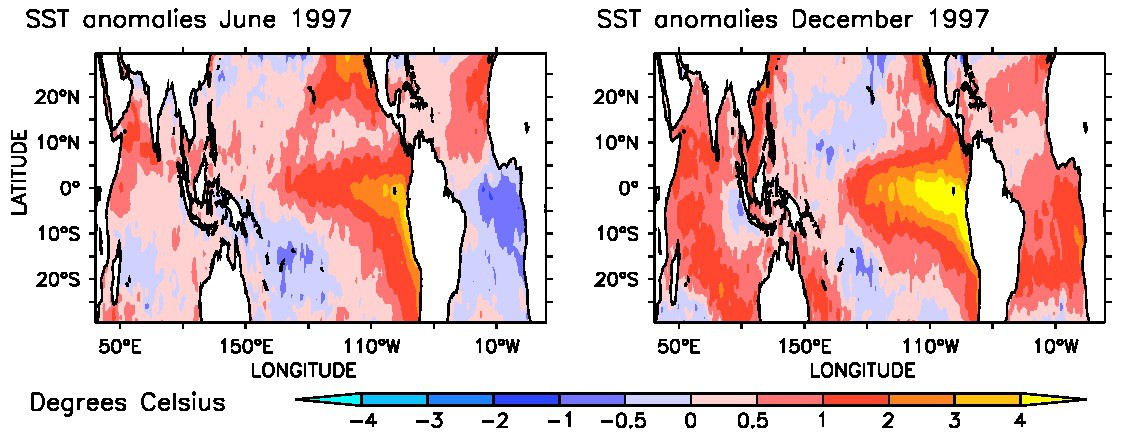
The development of the 1997 event appears influenced by the conditions in the Atlantic during boreal summer. The representation of this interaction and that with the Indian Ocean is thought to be important for predictability in the tropics. Notable are also the same-signed SST anomalies in tropical Pacific and Atlantic during the mature El Niño, which only occurs during a few events. Data: HadISST.
Interaction between the Pacific, Atlantic, and Indian Ocean basins is increasingly recognized as a key factor in understanding climate variability on interannual to decadal timescales. While it has long been known that El Niño-Southern Oscillation (ENSO) has far-reaching influences across the globe, it was commonly understood that these influences mostly operated in one direction, from the Pacific to other ocean basins and surrounding continents. More recent results, however, indicate that both the Atlantic and Indian Oceans may in turn influence the tropical Pacific in profound ways (see figure above for one particular example) and that they contain internal patterns of variability that are partly independent of ENSO.
This Research Focus (RF) on Tropical Basin Interaction (TBI) aims to create a consensus on the mechanisms underlying TBI and how these contribute to predictability, and to promote research on how these interactions are affected by low-frequency climate variability and long-term climate change. This will be achieved by using existing numerical simulations and observations, but also by coordinating new climate model experiments and by compiling new paleo proxy data. The RF will arrange workshops, conference sessions, and summer schools, and aims to produce several community papers.
Download: Full Proposal of CLIVAR Research Focus on Tropical Basin Interaction
Terms of Reference
● To promote analysis of existing GCM simulations, coordinate bespoke standard and hindcast pacemaker experiments, and foster analysis of novel monthly resolved coral proxy data.
● To host workshops to stimulate, coordinate, and synthesize research on TBI, and to design appropriate pacemaker experiments.
● To provide a concrete and robust estimate of the prediction skill associated with TBI; in particular, to quantify the tropical Atlantic and Indian Ocean contribution to prediction skill in the tropical Pacific.
● To assess how common model biases affect TBI, and identify the implications for climate predictions and climate change projections.
● To identify factors underlying low-frequency modulation of TBI and how they affect the decadal modulation of ENSO.
● To raise awareness of TBI through dedicated conference sessions.
● To write review papers to consolidate understanding of TBI.
● To host summer schools to get the future generation of researchers involved and strengthen capacity.
● To make output of the coordinated experiments freely available in order to invigorate research activities across the community.
● To deliver input on observational system requirements for monitoring TBI.
● To report annually to CLIVAR on progress of the RF-TBI













